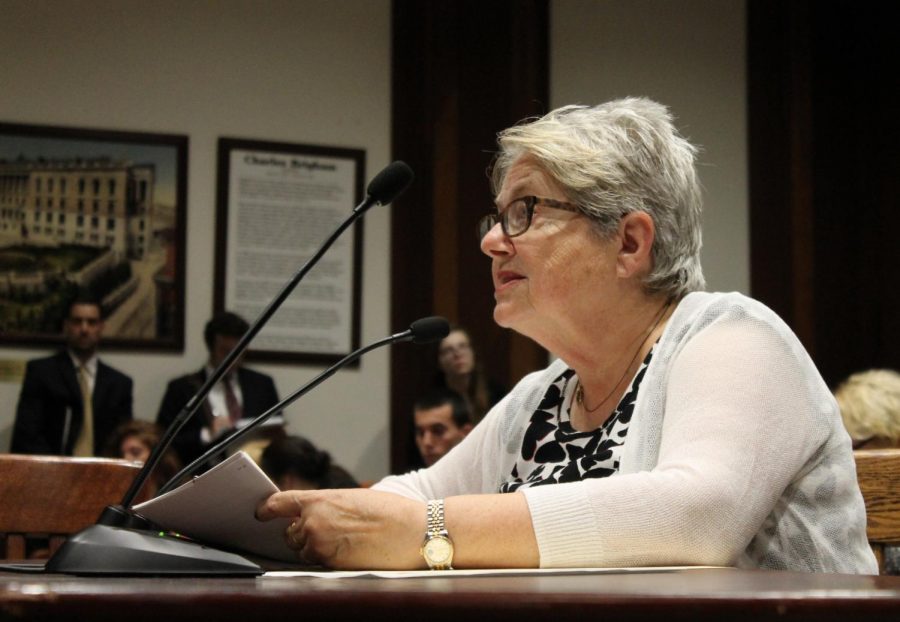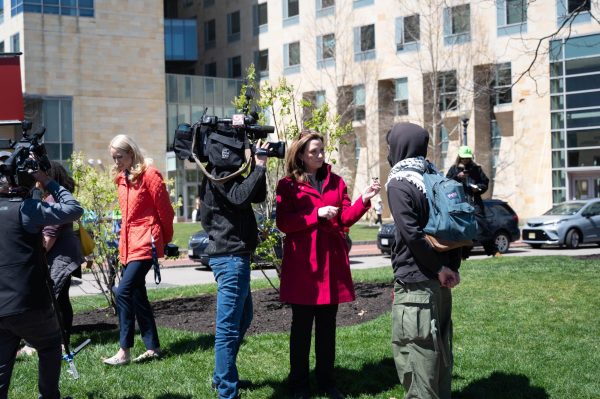After years of debate, the Massachusetts legislature bans conversion therapy
Democratic Rep. Kay Khan of Newton testifies before the Financial Services Committee last year.
April 3, 2019
The Massachusetts State Senate passed legislation (H.140) on March 28 that will ban state-licensed health care providers from practicing conversion therapy on minors within the LGBTQ+ community. Conversion therapy, which attempts to change a person’s gender identity or sexual orientation, is currently banned in 14 states and the District of Columbia.
The bill, which was introduced to the House of Representatives by Democratic Rep. Kay Khan of Newton and had 116 co-sponsors from the House and Senate, received overwhelming approval in both houses — 147-8 in the House and 34-0 in the Senate. Proponents of the bill argued that the practice of conversion therapy has been scientifically debunked and has no place as a credible mental health treatment.
“I am proud that I have persisted session after session in filing the Conversion Therapy Ban Bill and to be working with a broad coalition of over twenty statewide legal, mental health, child welfare, and LGBTQ organizations,” Khan said in a press release sent out last week, “as well as parents dedicated to promoting the well-being and safety of our children in Massachusetts.”
Prior to the bill, children under the age of 18 were subject to often harmful and abusive conversion therapy practices, including but not limited to efforts to change behaviors or gender expressions and attempts to curb sexual or romantic attractions toward people of the same sex.
The Massachusetts House and Senate passed similar legislation in 2018 that never made it to Gov. Charlie Baker’s desk. The House was noticeably split on the bill, as independent Rep. Susannah Whipps of Athol initially voted against the bill but voted for it during the second recorded vote. Other representatives supported the bill initially and opposed it during recounts.
This time, the bill clearly outlines what a healthcare provider — defined as any physician, psychologist, social worker, nurse or allied mental health and human services professional — can and cannot do.
Licensed practitioners are not to “attempt or purport to impose a change of an individual’s sexual orientation or gender identity,” or “advertise for or engage in sexual orientation and gender identity change efforts with a patient less than 18 years of age,” according to the bill.
Republican Sen. Vinny deMacedo said that while he and fellow Republican Sens. Bruce Tarr, Ryan Fattman, Donald Humason and Dean Tran oppose conversion therapy, they do not believe that the wording in the bill is clear enough and infringes on the rights of mental health professionals, WBUR reported.
Proponents of the bill believe it is an important step in advocating for rights within the LGBTQ+ community, particularly the rights of minors, who have a lack of autonomy when it comes to mental health treatment.
“At the end of the day, this bill is about prohibiting discrimination in health care settings for youth in the LGBTQ community,” Khan said.
The press release from Khan’s office included comment from Sam Brinton, head of advocacy and government affairs at The Trevor Project — a nonprofit organization focused on suicide prevention efforts among at-risk LGBTQ+ youth. The organization is working to end conversion therapy on a state-by-state basis.
“As the final legislative vote passes to protect LGBTQ youth from conversion therapy, it’s important to acknowledge that this bill will save numerous young lives in Massachusetts,” Brinton said. “Life-saving policy leaders like State Representative Khan, the hundreds of Representatives and Senators in support of this bill, and the thousands of local advocates from The Trevor Project’s 50 Bills 50 States campaign should be proud of their unwavering support of LGBTQ young people and survivors of conversion therapy.”
Advocates on Northeastern’s campus spoke out about the ban as well, including the president of NU Pride, Max Fournier. NU Pride is a community and safe space for the LGBTQ+ community on campus.
“The fact that practices such as conversion therapy exist in the United States, despite homosexuality being removed as a mental illness in 1973, is baffling,” Fournier said. “If we don’t have laws backing the right for LGBTQA people to exist in all forms, then we aren’t really as progressive as we think.”
Organizations such as NU Pride and The Trevor Project have lobbied for legislation advocating for LGBTQ+ rights.
“We were involved in ‘Yes on 3’ to protect trans folks in public spaces,” Fournier said. “For example, we had a meeting educating students on the topic of the bill and signed students up to vote in the election.”
Though the bill marks progress in the protection of LGBTQ+ rights, there are unanswered questions about the protection of minors within Massachusetts. Moya Bailey, an assistant professor of women’s, gender and sexuality studies at Northeastern, believes that there are still things to do to protect at-risk youth.
“This overwhelming support for young people’s autonomy is so important given their vulnerability to those responsible for their care and well-being,” Bailey said. “While this is a win in some ways for the youth of Massachusetts, it does not keep parents from going out of state or other states from still engaging in this harmful practice.”
Other states in New England have made similar strides to outlaw the practice, as state legislators in Maine reintroduced legislation February 28 to prohibit certain licensed professionals from providing conversion therapy to minors after Gov. Paul LePage vetoed a similar bill last year, citing parents’ rights to seek medical treatment for their children that doesn’t “oppose” their religious beliefs.
In 2016, Pittsburgh was the first municipality in Pennsylvania to ban conversion therapy for minors, and other Pennsylvania cities have followed their lead. Slowly but surely, states are adopting laws that would ban this practice.
“Not only is a ban on conversion needed, but it’s long overdue,” Fournier said. “Conversion therapy is incredibly harmful to the LGBTQA community, is highly ineffective, and … causes mental and physical trauma.”


















